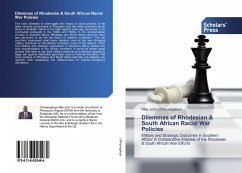The book attempts to interrogate the impact of racial policies of the white minority government of Rhodesia and the white apartheid South Africa in Southern Africa in the fight against what was perceived to be communist onslaught in the 1960s and 1980s. In the decolonization process in Southern Africa, Rhodesia and South Africa stood for what was perceived to be the last stand of 'western civilisation'. The two countries possessed what many analysts saw as the two strongest military machines on the African continent, south of the Sahara. Their final military and strategic capitulation in Southern Africa marked the total decolonization of the African continent. It would be these racial policies that were to sap their military potential and national capacity to wage war against nationalist guerrillas, wars of national liberation. The racial policies of Rhodesia and South Africa kept the pre-majority rule regimes from maximising the effectiveness of counter-insurgency operations.
Bitte wählen Sie Ihr Anliegen aus.
Rechnungen
Retourenschein anfordern
Bestellstatus
Storno








